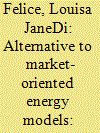| Srl | Item |
| 1 |
ID:
163568


|
|
|
|
|
| Summary/Abstract |
From a biophysical perspective, energy is central to the behaviour of social-ecological systems. Its ubiquity means that energy is entangled with nexus elements, including water, land, emissions and labour. At the science-policy interface, large market-oriented energy models dominate as the tool to inform decision-making. The outputs of these models are used to shape policies, but strongly depend on sets of assumptions that are not available for deliberation and gloss over uncertainties. Taking an approach from complexity, we propose an alternative to market-oriented energy models, describing the behaviour of energy systems in relation to patterns of nexus elements across hierarchical levels. Three characteristics are central to the approach: (i) the distinction of the model's building blocks into functional and structural elements; (ii) their hierarchical organisation and (iii) the description of nexus patterns at each level, through the tool of the processor. To illustrate the model, it is applied to Catalonia's energy sector, linking production and consumption patterns. The framework may help inform stakeholder deliberation on pressing energy and nexus issues.
|
|
|
|
|
|
|
|
|
|
|
|
|
|
|
|
| 2 |
ID:
092784


|
|
|
|
|
| Publication |
2009.
|
| Summary/Abstract |
This paper applies the so-called Multi-Scale Integrated Analysis of Societal and Ecosystem Metabolism (MuSIASEM), based on Georgescu-Roegen's fund-flow model, to the Spanish region of Catalonia. It arrives to the conclusion that within the context of the end of cheap oil, the current development model of the Catalan economy, based on the growth of low-productivity sectors such as services and construction, must be changed. The change is needed not only because of the increasing scarcity of affordable energy and the increasing environmental impact of present development, but also because of the aging population. Moreover, the situation experienced by Catalonia is similar to that of other European countries and many other developed countries. This implies that we can expect a wave of major structural changes in the economy of developed countries worldwide. To make things more challenging, according to current trends, the energy intensity and exosomatic energy metabolism of Catalonia will keep increasing in the near future. To avoid a reduction in the standard of living of Catalans due to a reduction in the available energy it is important that the Government of Catalonia implement major adjustments and conservation efforts in both the household and paid-work sectors.
|
|
|
|
|
|
|
|
|
|
|
|
|
|
|
|